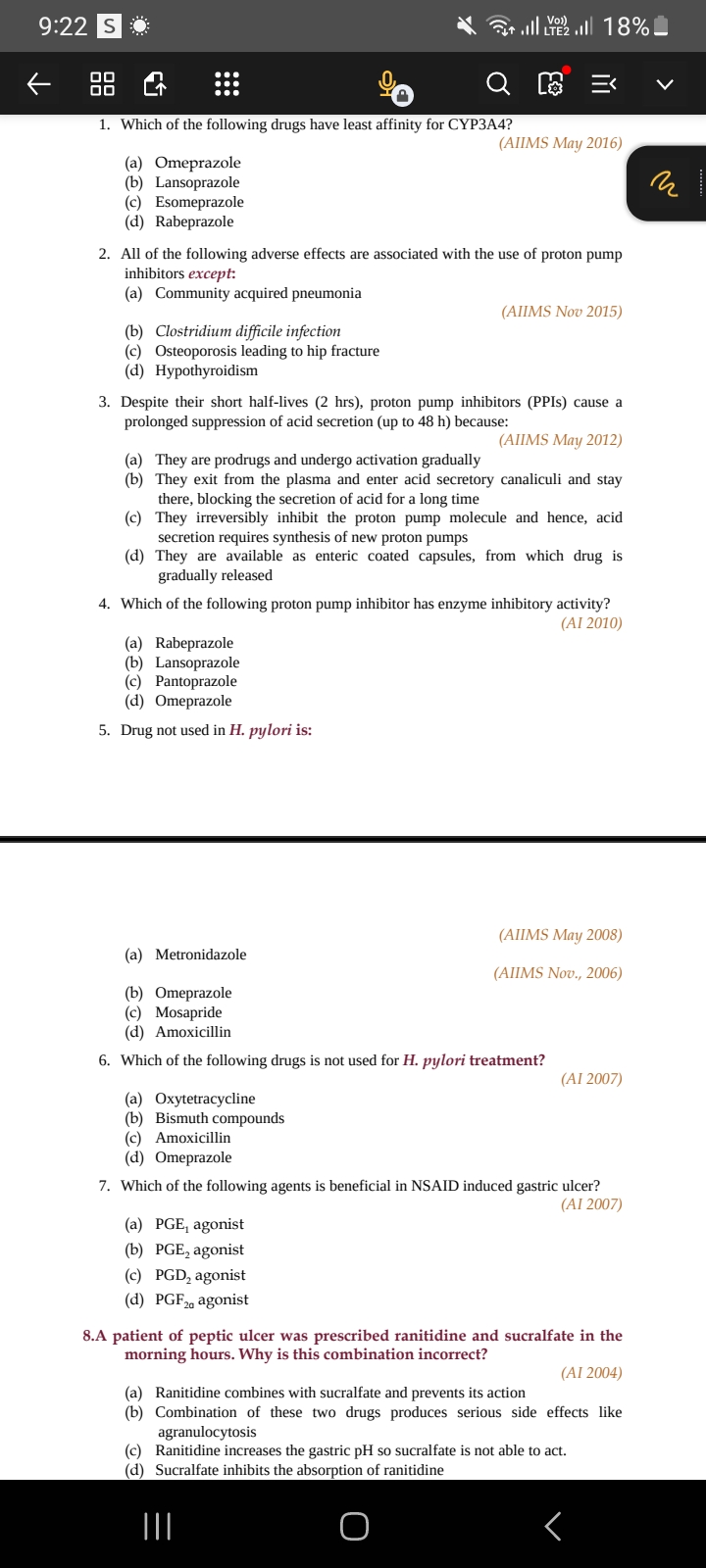Which of the following drugs have least affinity for CYP3A4? All of the following adverse effects are associated with the use of proton pump inhibitors except: Despite their short... Which of the following drugs have least affinity for CYP3A4? All of the following adverse effects are associated with the use of proton pump inhibitors except: Despite their short half-lives (2 hrs), proton pump inhibitors (PPIs) cause prolonged suppression of acid secretion (up to 48 h) because: Which of the following proton pump inhibitor has enzyme inhibitory activity? Drug not used in H. pylori is: Which of the following drugs is not used for H. pylori treatment? Which of the following agents is beneficial in NSAID induced gastric ulcer? A patient of peptic ulcer was prescribed ranitidine and sucralfate in the morning hours. Why is this combination incorrect?

Understand the Problem
The questions are related to pharmacology, specifically focusing on proton pump inhibitors and their effects, uses, and interactions in clinical scenarios, particularly related to conditions like H. pylori and NSAID-induced gastric ulcers.
Answer
Rabeprazole has the least affinity for CYP3A4. Hypothyroidism isn't an adverse effect of PPIs. PPIs irreversibly inhibit the proton pump. Omeprazole has enzyme inhibitory activity. Mosapride isn't used for H. pylori. PGE₁ agonist helps NSAID-induced ulcers. Sucralfate inhibits ranitidine's absorption.
The drug with the least affinity for CYP3A4 is rabeprazole. The adverse effect not associated with proton pump inhibitors is hypothyroidism. PPIs cause prolonged acid suppression because they irreversibly inhibit the proton pump. The PPI with enzyme inhibitory activity is omeprazole. Mosapride is not used in H. pylori treatment, neither is oxytetracycline. PGE₁ agonist is beneficial in NSAID-induced gastric ulcers. The combination of ranitidine and sucralfate is incorrect because sucralfate inhibits the absorption of ranitidine.
Answer for screen readers
The drug with the least affinity for CYP3A4 is rabeprazole. The adverse effect not associated with proton pump inhibitors is hypothyroidism. PPIs cause prolonged acid suppression because they irreversibly inhibit the proton pump. The PPI with enzyme inhibitory activity is omeprazole. Mosapride is not used in H. pylori treatment, neither is oxytetracycline. PGE₁ agonist is beneficial in NSAID-induced gastric ulcers. The combination of ranitidine and sucralfate is incorrect because sucralfate inhibits the absorption of ranitidine.
More Information
Proton pump inhibitors are highly effective for reducing stomach acid due to their mechanism of action, involving irreversible enzyme inhibition, which contributes to their prolonged effect despite a short half-life.
Tips
Be cautious about drug interactions with PPIs as they can alter the metabolism of other drugs. Ensure understanding of drug-specific adverse effects and indications for correct clinical use.
Sources
- Proton Pump Inhibitors (PPI) - StatPearls - NCBI Bookshelf - ncbi.nlm.nih.gov
- 25 Years of Proton Pump Inhibitors: A Comprehensive Review - PMC - ncbi.nlm.nih.gov
- Proton-pump inhibitor - Wikipedia - en.wikipedia.org
AI-generated content may contain errors. Please verify critical information